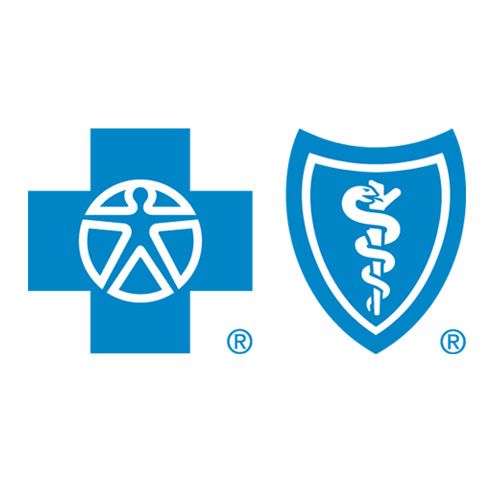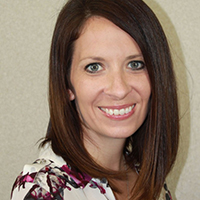Understanding how to address racial and health disparities in cancer treatment
July 7, 2021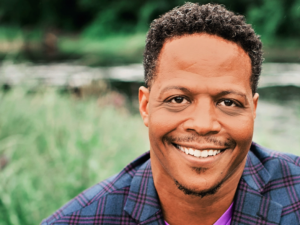 “We need to learn how to share power, how to work and partner to move forward to create a more racially healthy and just experience. Organizations like Blue Cross need to learn how to walk with community— take their cues and their lead to understand what looks and feels different based on community needs and the individuals affected.” -Bukata Hayes, shared during the Angel Foundation event, “Understanding Our Differences: A Virtual Forum”
“We need to learn how to share power, how to work and partner to move forward to create a more racially healthy and just experience. Organizations like Blue Cross need to learn how to walk with community— take their cues and their lead to understand what looks and feels different based on community needs and the individuals affected.” -Bukata Hayes, shared during the Angel Foundation event, “Understanding Our Differences: A Virtual Forum”
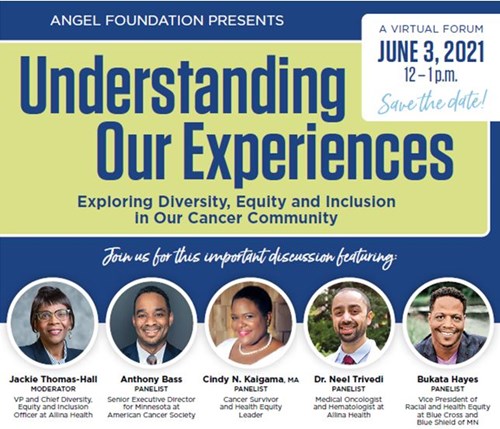 To make meaningful and lasting change, organizations must learn how to truly listen and collaborate with communities they are working to serve. This was, in a nutshell, the message that Bukata Hayes, Blue Cross’ vice president of racial and health equity, reinforced during a recent panel discussion on diversity, equity and inclusion in the Twin Cities cancer community.
To make meaningful and lasting change, organizations must learn how to truly listen and collaborate with communities they are working to serve. This was, in a nutshell, the message that Bukata Hayes, Blue Cross’ vice president of racial and health equity, reinforced during a recent panel discussion on diversity, equity and inclusion in the Twin Cities cancer community.
The event, “Understanding Our Differences: A Virtual Forum,” was hosted by the Angel Foundation, a Twin Cities-based nonprofit organization focused on helping people with cancer and their families.
Bukata was among six expert voices on this panel, all who shared meaningful insights about opportunities for growth and change to ensure that care for people with complex conditions—and specifically cancer treatment—can be more equitable for Black, Indigenous and communities of color (BIPOC communities).
Addressing racial and health disparities for cancer patients
A survey of Angel Foundation clients, conducted by the Wilder Foundation, tangibly showed the disparities that exist between BIPOC and white participants. The survey had three key learnings:
1. Medical bills and healthy foods are the hardest things for Angel Foundation participants to afford. This was more pronounced among those identifying as BIPOC.
2. Paying for basic needs was more difficult for BIPOC respondents in every category than white respondents.
3. The COVID-19 pandemic has only exacerbated these existing disparities, with 91 percent of BIPOC participants reporting the pandemic has made accessing basic needs more difficult, compared to 74 percent of white participants.
Angel Foundation's work to address health disparities
Angel Foundation President and CEO Dave Becker shares how the organization has seen these disparities firsthand, which led them to begin to address the topic directly.
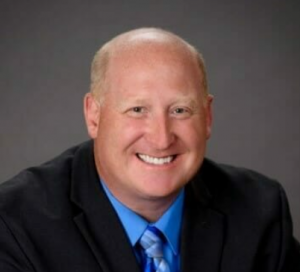 “As a leader in the cancer community, Angel Foundation sees the burden cancer delivers. We have found that Black, Indigenous, and people of color are disproportionately impacted by this disease in many ways,” he says.
“As a leader in the cancer community, Angel Foundation sees the burden cancer delivers. We have found that Black, Indigenous, and people of color are disproportionately impacted by this disease in many ways,” he says.
“We are also very aware that we do not understand every person’s experience,” Dave says, noting the forum on diversity, equity and inclusion was a start in the work to gain understanding and begin to identify strategies to address health disparities in cancer care.
“We need many voices and experiences at our table to help those facing health equity challenges and we are committed to being a convener to move this issue forward.”
Listening and building relationships key to moving work forward
The willingness to listen is critical, Bukata emphasizes. “When doing this work, large enterprises need to take a much humbler stance. Part of the problem with large organizations is that we think we have the solution,” Bukata says.
In addition, Bukata says that being a local partner committed to building relationships with the communities being served is an important part of the equation.
“We need to truly listen to the stories and hear what people say. While we may have some prerequisite knowledge, we cannot apply a predetermined solution, but we must listen, then go back and partner.”
“Blue Cross is in a strong position to be a strong community partner because we are a local, Minnesota-based organization. We can do some things in partnership with community that other are not able to do,” he says.
But, to accomplish these goals, he says that trust must be built—and that takes time and intention with each community.
“In working toward this goal, we do recognize that while Blue Cross has trust in some communities, we have work to do to build greater trust in other communities,” Bukata says. “Because we are local, we can do that work purposefully and authentically.”
Importance of addressing financial disparities
 When doing work to address racial disparities within treating complex illnesses like cancer, finding solutions to address the financial burden associated with the significant expense of treatment is a high priority. For families in lower income brackets, the need for financial support as medical bills mount, on top of monthly expenses, is significant.
When doing work to address racial disparities within treating complex illnesses like cancer, finding solutions to address the financial burden associated with the significant expense of treatment is a high priority. For families in lower income brackets, the need for financial support as medical bills mount, on top of monthly expenses, is significant.
Angel Foundation’s grants help families address very real financial needs. As medical bills mount, these one-time grants— at an average of $800—ensure that families have the funds they need to pay their rent or mortgage payment, utility bills or buy groceries for their family, while being faced with also having to pay medical bills.
“Many people in these communities are in lower income brackets and already facing extreme social determinants of health challenges,” Bukata says. “If an $800 grant is the threshold that keeps people in a home and able to get groceries for a month or two, that shows how tenuous that balance is. For these families, $800 is the balance between surviving or not.”
In fact, seeing the number of their clients who identified as BIPOC led Angel Foundation to begin focus efforts to address racial disparities within cancer care.
 “When Angel Foundation started, they didn’t ask for demographic data about their clients or do any targeted outreach to specific demographic communities,” explains Kirstie Foster, vice president of brand, communications and social impact at Blue Cross and member of the Angel Foundation Board of Directors.
“When Angel Foundation started, they didn’t ask for demographic data about their clients or do any targeted outreach to specific demographic communities,” explains Kirstie Foster, vice president of brand, communications and social impact at Blue Cross and member of the Angel Foundation Board of Directors.
“What they found, however, was that about 40 percent of their clients identify as BIPOC. That led Angel Foundation to realize that they need to directly engage with BIPOC communities as there is a clear need."
Blue Cross’ support of Financial Cancer Care program
Blue Cross believes so strongly in the importance of the work that Angel Foundation is doing to address the financial burden of cancer care that in early 2020, the company joined Ameriprise Financial and AbbVie Pharmaceuticals in making a significant financial contribution to launch Angel Foundation’s Financial Cancer Care program. The program matches cancer patients with financial advisors to talk through any financial struggles that they face as a result of their cancer diagnosis.
“About 70 people have gone through the program, to date,” Kirstie says. “By working with a financial advisor, people going through cancer treatment can address concerns and make a plan to ensure they don’t lose their house, their car or go into extreme debt. There have already been some very lifechanging outcomes thanks to this program.”
Learn more about the impact of the Financial Care program, in this article from the Star Tribune and in this Angel Foundation video. More stories about how Blue Cross’ support of the Financial Care program has made a real impact in people’s lives will be shared on our blog in the coming months.
Blue Cross has an ongoing commitment to partner with communities in addressing the root causes of racial and health inequities. Amongst this work, in 2020, Blue Cross joined local organizations, municipal and county governments and the Minnesota House of Representatives in declaring that racism is a public health crisis. And earlier this year, Blue Cross created a web portal to help individuals and businesses learn, reflect and change on their journey toward anti-racism.

